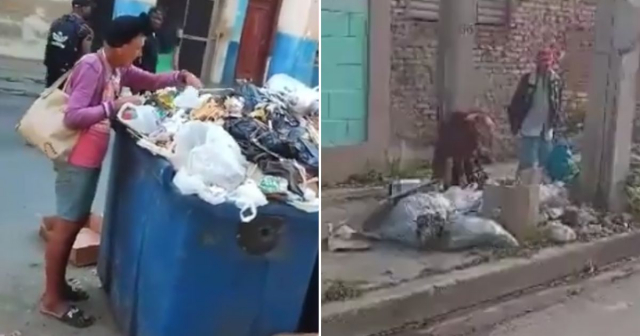Cuban authoritiesThey forbade a helpless woman from asking for help showing a sign stating that she has no food or home to live in and was forced to leave a park in Havana.
The woman, who comes from Holguín, was this Monday in the park located in Ayestarán and 20 de Mayo asking for money with a sign with the phrases "I don't have food" and "I live on the street", when authorities demanded that she remove the sign. banner and left the place.
Interviewed by the newspaperCubaNet, the woman - whose name was not revealed - explained that she has been on the street for 12 years and has been an HIV patient for about 18.
“I live on the street and I am going to turn 18 with AIDS,” he responded to the independent media. “They have not resolved anything for me, everything has remained in words, the same here in Havana as in Holguín.”
In addition, he reported that the authorities took away his (social security) checkbook in the eastern province and he does not receive the food module that the government delivers to HIV patients. “I have nothing,” he said.
Recently, the Ministry of Labor and Social Security revealed thatIn Cuba, at least 3,690 homeless people have been registered between 2014 and 2023.
Although the official figure does not really reveal the total number of homeless people in the country, it does highlight thealarming growth of begging, while the government continues to implement economic measures that push more and more of the population to the edge of poverty.
The data indicates thatThe number of people living on the streets has tripled, if the statistics from the 2012 Population and Housing Census are taken into account, the last one carried out in Cuba, and which counted more than 1,100 homeless people.
This increase is influenced bylow purchasing power of citizens -mainly, the most vulnerable sectors of society, such as the elderly-,rampant inflation, aging, food and drug shortages, among other factors, along withreprehensible measures carried out by the government, to the detriment of its population.
The regime has admitted that it has no alternatives for people who live on the streets, while recognizing the increase in this population in people under 60 years of age.
Cuba is considered the poorest country in Latin America, according to a study by the firmDatoWorld, a renowned international electoral observatory that evaluates parameters such as per capita income, access to health services, social security, food and housing spaces.
In April 2023, the country had a 72% poverty rate, a figure that placed it at the forefront of the Latin American region.
“Cuba is a case of pauperism with no solution in sight. With an average salary lower than the value of the Basket of Reference Goods and Services (CBSR) and with miserable pensions,” stated the renowned economist Pedro Monreal.
In September 2023, the Cuban Observatory for Human Rights (OCDH)denounced the worrying increase in extreme poverty in Cuba.
The non-governmental organization detailed in the VI Report on the State of Social Rights in Cuba, that “88% of Cubans live in extreme poverty, 13% more than in 2022”.
What do you think?
COMMENTFiled in:
